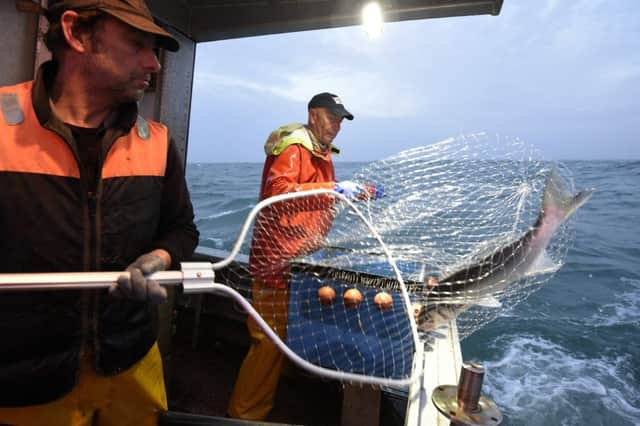Superstar fish in danger as popularity of seabass soars


Seabass, regarded as the “superstar of the seas”, has become one of the most popular fish to eat in the UK and is a favourite in many restaurants, endorsed by celebrity chefs.
The advice from the International Council for the Exploration of the Seas, which provides information and advice to countries and international bodies, comes amid fear that seabass numbers are now dangerously low.
Advertisement
Hide AdAdvertisement
Hide AdThe call to conserve seabass has been supported by the Marine Conservation Society (MCS). But the charity also says it is concerned the ban may not be implemented in full, leaving the stock in dire straits by 2018.
The emergency measures imposed by the EU last year and further restrictions from January this year include a complete ban in February and March to protect spawning seabass, with the exception of a “1 per cent by catch” allowance for trawl fisheries.
While it is clear these measures are achieving reductions in catches and helping to protect juveniles, critics say they do not go far enough to prevent further declines in the population, which is now at a critically low level.
Samuel Stone, MCS fisheries and aquaculture programme co-ordinator, said he believed the writing has been on the wall for the bass fishery for a number of years.
“Despite that, the fishing industry has fought hard to play down the seriousness of the situation.”
In 2014, scientists recommended an 80 per cent reduction in bass catches, and while large reductions have been made, the resulting reductions have been more like 50 per cent.
Even then there is huge uncertainty in the actual catch figures for bass as it is known to be illegally caught and sold in the UK and there is a large “recreational catch”.
MCS already has a “red” rating for seabass in its Good Fish Guide, advising consumers and businesses to avoid buying bass until the source fishery has recovered to a healthier state.
Advertisement
Hide AdAdvertisement
Hide AdHowever, Barry Deas, chief executive of the National Federation of Fishermen’s Organisations, said a year-long moratorium was not the complete answer to declining bass stocks and wider issues needed to be examined.
“Rebuilding the stock is going to take some time and depends on environmental factors which affect ‘recruitment’, that is, young seabass being born,” he said.
“We also need to look at issues such as the amount of seabass caught during ‘mixed’ fishing when the intention is not to catch seabass but they are caught inadvertently.
“This means looking at gear geometry, in other words, the mesh size of nets.
“Another aspect would be looking at nursery areas for seabass.”